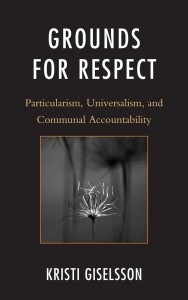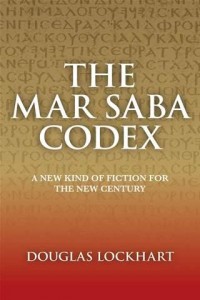Review: Grounds for Respect

It’s taken me a while to digest this book by local academic and author, Kristi Giselsson. Kristi is a compassionate and articulate philosopher who has made balanced and thoughtful contributions to the public debate on a number of social issues recently.
This book Grounds for Respect: Particularism, Universalism, and Communal Accountability is a published version of her doctoral thesis in philosophy at the University of Tasmania. It is an exploration of “the question of what grounds are needed in order to justify respect for others.” (Page 1). This is a fundamental question, the diverse answers to which contribute a great deal to the unspoken (and often unknown) assumptions that shape and guide the cross-purposed conversations that epitomise public dialogue.
Giselsson’s contribution is to explore this using philosophical analysis and critique. This necessarily involves a philosopher talking about philosophers, because that is how such an analysis works: positions are described, clarified, analysed for their differences; their implications are drawn, their internal and external logic put under test; and finally a path of good thought and good conscience is found through the heady tangle of these broad-shouldered giants.
For myself, this was my first introduction to this level of philosophical treatise. I came to the book motivated by the practical and socio-political applications: when you’re talking about personhood issues such as abortion, euthanasia, marriage, freedom of speech and so on, then the nature and basis of respect is of significant relevance. I was struck, however, by the philosophical exploration itself.
I have only had one experience like it, when I first studied church history in my BMin studies, suddenly I had insight into where people where coming from, what motivated them, and why. Similarly, Giselsson’s exploration of the pedigree of philosophical thought, the sort of thought that is currently and actively applied in our Western World, gave me new insights. It also made me thirsty to learn more, hence my current little project.
Giselsson’s thesis is that “some form of universalism is needed to ground respect for the particular; in order to justify why we should respect others” (Page 2). Universalism is the sense of moral universalism which asserts that there is a particular system of standard, morality or ethic that can be applied universally and which is not contingent on the particulars of a person (e.g. their rationality or autonomy). Giselsson also emphasises a foundational humanism as a necessary aspect of our notions of respect. This is “humanism” as an affirmation of an innate, non-contingent, ontological, and unique reality (and value) of the human person.
The form of Giselsson’s argument therefore includes an exploration and ultimate rebuttal of posthumanist philosophers such as Derrida, Foucalt and Lyotard (all of whom I now want to read for myself).
…posthumanist critiques of universalist assumptions within humanism are themselves based on unacknowledged ethical assumptions of universal value and respect for others… (Page 2)
…at the very heart of Derrida, Foucault and Lyotard‘s critique of humanism lay a moral judgment; that universalism is inherently unjust in its apparent exclusion of particular others… this ethical judgment is made without recourse to any justificatory philosophical grounds, but rather relies on the force of its rhetorical – and ultimately humanist – appeal alone. This ethical rejection of universal humanism has in turn had an enormous impact over a wide range of disciplines, but specifically in those areas of scholarship that deal with those traditionally marginalized within Western philosophy…” (Page 117)
The broad brush strokes of the argument might be characterised by breadth and depth. This first part of the book is a consideration of depth – is anything less than universalism enough to provide a coherent basis for respect? Giselsson shows that posthumanism either fails to provide for respect, or where it asserts its claim that it can, it has actually slipped into the universalism (albeit usually of a less caricatured sort) that is trying to be avoided.
The second part of the book looks at the breadth question and therefore tests the bounds of humanism. In particular, could animals be included as “human” to the extent that respect can be both encapsulated and applied? This second consideration tests utilitarian approaches such as that of Singer. Giselsson shows that while a utilitarian approach looks to assess a person’s particular characteristics or functions to justify respect, a humanist approach asserts common ontological or innate grounds that are more robust.
By way of example:
Dismissive views of the elderly and those suffering from dementia are only affirmed by utilitarian principles that emphasize the greater good of society and the comparative worthlessness of a cognitively impaired life. (Page 175)
Having drawn the broad boundaries. Giselsson turns to those who thinking is within the bounds of universalist humanism and examines their formulation for grounds for respect. The thread being followed here is not the extent of human being but the characteristics – self-determination, self-creativity, accountability, subjecthood and the like are all explored. She finds them wanting for her purposes:
I have also argued that current Western liberal and humanist theories that attempt to readdress the foundations needed for universal respect still conceptualize these grounds in terms of what characteristics an individual must possess in order to qualify for equal moral consideration. These grounds still revolve around traditional notions of moral personhood, these being selfdetermination, rationality and autonomy; and they inevitably exclude all humans not possessing such qualities. (Page 259)
Giselsson therefore posits her own formulation of human being, which has to do not with biology or economic characteristics but with our “way of being” (Page 260). She therefore emphasises community as a necessary and innate part of human personhood and demonstrates that a concept for respect can rest upon the operation of accountability within and from the human community. She explores this conception for inconsistencies and negative implications and concludes:
The ontological foundation I have offered, while partial rather than complete in its conception, seeks to balance the tension between particularism and universalism by showing a structure of human morality that is irreducibly communal in its practice. Moreover, while arguing that the inter-dependent practices of social standards of value and reciprocal accountability are thoroughly communal in nature, the universal standard of value implied by the assumption of reciprocal accountability – that each human is an end in themselves – ensures that justice is not reduced to communal consensus alone, as this standard provides for the possibility of respect for particular individuals beyond the relative nature of localized and particular norms (Page 296)
The foundation that Giselsson offers is indeed “partial rather than complete” because while she circumscribes respect with the well-argued conception of communal accountability she stops short, understandably, before filling that notion with articulations of what particular behaviours or attitudes or beliefs might be worthy of being held to account. Therefore, while she has demonstrated grounds for respect without recourse to divine revelation, I question whether she could build upon those grounds without doing so.
This book took some time to digest. It made me realise how little I know and how much I need to know about the philosophical tendrils that generate and move the values and people of our society. There is so much lack of respect, belligerence and assertions and misuse of one another in Western Society. Much of it comes from those sections of society who espouse care and tolerance and love yet find it so hard to articulate respect and understanding and community outside of their own narrow bands.
This book has made me thirsty to know more, to explore in particular some of the 20th Century philosophers who influenced the current generation of culture-shapers. To that end this book has whet my appetite. And that makes it a good book!



